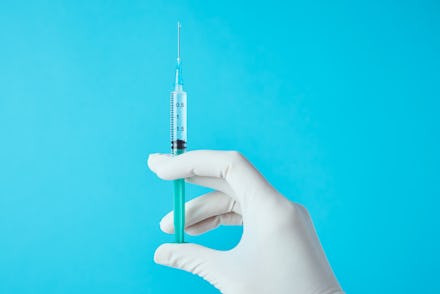Pfizer says their coronavirus vaccine is 90% effective. Here's what we know so far

Drug giant Pfizer announced early data results this morning that suggest that their COVID-19 vaccine is 90% effective at preventing coronavirus infection. If these findings are accurate, this is indeed a historic moment in medical science. No one has ever created a vaccine within a year and Pfizer has stated that there have been no serious side effects so far, the New York Times reported. Here’s what we currently know about the politics, efficacy, and timeline of Pfizer's coronavirus vaccine.
Pfizer developed this vaccine in partnership with German drugmaker BioNTech, and it is currently in Stage 3 clinical trials. The vaccine is given in two doses spaced 21 days apart. Almost 44,000 volunteers are enrolled in the study, the companies said, and about 39,000 of those participating have received their second dose, according to STAT News.
Half of the participants in Pfizer’s study received the vaccine and half received a placebo. So far, only 94 of the almost 44,000 volunteers have contracted COVID-19, which means that if the 90% effectiveness rate is correct, fewer than nine of those who received the real vaccine in full have gotten infected after being vaccinated, according to the Times. In order to prove the efficacy of the vaccine, trials will continue until 164 individuals involved in the study have confirmed cases of COVID-19.
In case that feels confusing, Pfizer is not trying to get people sick. The drug developer needs a certain number of people in both the control and non-control groups to test positive for COVID-19 in order to determine an accurate effectiveness rating for FDA approval. The FDA currently only requires that COVID-19 vaccines are 50% effective to meet the standards for emergency approval, and no one was expecting anything close to 90%, the Times reported.
The other thing that needs to happen before Pfizer seeks emergency FDA approval is that half of the patients in their study must be observed for safety issues for at least two months following their second dose. Pfizer said that they expect to file for approval in the third week of November.
Unlike other frontrunners in the race to find a vaccine for COVID-19, Pfizer was not part of Operation Warp Speed, which means that they did not take money from the Trump administration’s coronavirus program for research or development. That doesn’t imply, however, that they aren’t taking any money from the government. Pfizer took $1.95 Billion from the Department of Health and Human Services — HHS — in July to produce and deliver 100 million doses of the vaccine to the U.S. government.
No one is positive when, exactly, the vaccine will be available to the American public. Pfizer said that based on current projections it expects to produce globally up to 50 million vaccine doses in 2020 and up to 1.3 billion doses in 2021, reported MSN. But Pfizer CEO Albert Boura told CNN that "the vaccine will be available for free to all American citizens.” This begs the question of who is considered a citizen in the eyes of public health and Big Pharma, and whether those who have been excluded from Trump’s America will receive equal access.
For his part, President-elect Joe Biden is cautiously optimistic. “Even if that is achieved, and some Americans are vaccinated later this year, it will be many more months before there is widespread vaccination in this country,” he said in a press statement this morning.
Biden also reminded us that this possible vaccine does not change the “urgent reality” that Americans face, and we still have to mitigate the risk of infection in other ways. Biden mentioned masking and social distancing, and to that list I’d like to add not hanging out with a Trump supporter indoors.